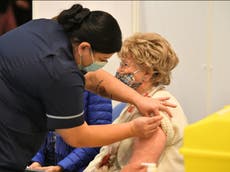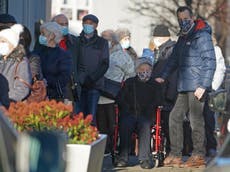Sean Dyche believes the lives of his footballers are worth more than yours and your family – but we all need to wait our turn for the vaccine
Teachers, police and footballers have all made their case for early vaccinations, but inoculating healthy people will leave millions of very ill people to die


Your support helps us to tell the story
From reproductive rights to climate change to Big Tech, The Independent is on the ground when the story is developing. Whether it's investigating the financials of Elon Musk's pro-Trump PAC or producing our latest documentary, 'The A Word', which shines a light on the American women fighting for reproductive rights, we know how important it is to parse out the facts from the messaging.
At such a critical moment in US history, we need reporters on the ground. Your donation allows us to keep sending journalists to speak to both sides of the story.
The Independent is trusted by Americans across the entire political spectrum. And unlike many other quality news outlets, we choose not to lock Americans out of our reporting and analysis with paywalls. We believe quality journalism should be available to everyone, paid for by those who can afford it.
Your support makes all the difference.The race to grab a vaccine was always going to be ugly. Though tier 4 restrictions meant we weren’t confronted with the scenes traditionally broadcast on television news this Boxing Day, of shoppers sprinting through the doors of shops in order to grab bargains, we don’t need to be reminded that people can quickly become unseemly when they want something.
As is the case with vaccines. The programme to inoculate the most vulnerable in society – our elderly, who have an infection fatality rate of more than 5 per cent if over 80, compared to those under 40, who have a 0.1 per cent chance of dying – was barely a month old when people lost their patience.
We are now teetering dangerously close to a “whoever shouts loudest gets the vaccine first” mode of distribution.
First were the teaching unions, who earlier this week said the country’s 430,000 teachers ought to receive vaccinations above some of the most vulnerable in society because they were exposed to up to 30 children at a time in a classroom.
Those teachers who have underlying health conditions – who are already prioritised in the list put out by the Joint Committee on Vaccination and Immunisation (JCVI) – should not be in the classroom anyway. The shutting down of face-to-face teaching for all but the children of essential workers means healthier colleagues should also be facing fewer children.
The reason given by unions for wanting to vaccinate teachers is a public health one: they say classrooms are vectors of transmissions, and vaccinating teachers would stop that. This is an inadequate argument. Children wouldn’t be vaccinated, and would still go home to their parents and grandparents, and spread the virus.
Vaccinating 430,000 teachers would do nothing more than shunt 430,000 people who need vaccines further down the queue at a time when supplies are scarce and the rollout is slow.
What the teachers’ call for vaccines did do was break the dam. The next day, police unions said they too were more worthy of a vaccine than others, because they encountered more people on a day-to-day basis. They wanted bumping up the queue, too. The day after, Sean Dyche, a Premier League football manager, said the league’s 559 players should be vaccinated early to save money on testing.
Who is next to clamour for preferential treatment? Will the 440,000 university staff follow the 430,000 teachers? If the 130,000 full-time equivalent police officers say they should skip ahead because they encounter the public more often than most, what about the 2.9 million retail workers or 1.1 million bank workers?
Very quickly we get into numbers that mean millions of absolutely healthy people would leave millions of very ill people to die.
Modelling by the Covid-19 Actuaries Response Group shows that just 20 vaccines jabbed into the arms of care home residents saves one life, and 160 into the arms of over-80s. By contrast, you need to vaccinate 47,000 healthy people under the age of 50 to save a single life.
The risk of the “shout loudest” campaign succeeding in ordinary times, with an ordinary, competent government, would be minimal. Cooler heads would prevail; politicians would explain they were following the best public health advice, drawn up by expert epidemiologists and the chief medical officers of the four home nations, and that would be that.
But we aren’t in ordinary times, and we don’t have an ordinary government. Boris Johnson’s desire to make people happy, rather than keep them safe, means he caves in quicker in the face of public pressure than most. There is a very real danger he could say yes, and jeopardise millions of people’s lives.
Fear causes us to lose our sense of rational thinking. In my heart, I would like to skip the vaccine queue and go straight to the front. I would like the assurance that I was in some way protected from a dangerous and potentially deadly disease now, rather than later this year. But I know doing so would mean those who need it more would be delayed – and in a rapidly spreading pandemic overwhelming the NHS, every second counts.
So we need to call a spade a spade. We need to discourage a free-for-all in oneupmanship of the potential impacts of the pandemic if certain populations aren’t vaccinated.
By asking to jump their turn, Sean Dyche believes the lives of his footballers are worth more than yours and your family. Teaching unions believe the lives of their staff are worth more than yours and your family. Police and crime commissioners believe the lives of their officers are worth more than yours and your family. They aren’t.
The agonising length of this pandemic has been down to individualistic, rather than collective thinking. People deciding to bend the rules – thinking they know better than the experts – has caused untold misery, suffering and deaths.
We are all scared. But we need to be patient, and we need to wait our turn.




Join our commenting forum
Join thought-provoking conversations, follow other Independent readers and see their replies
Comments